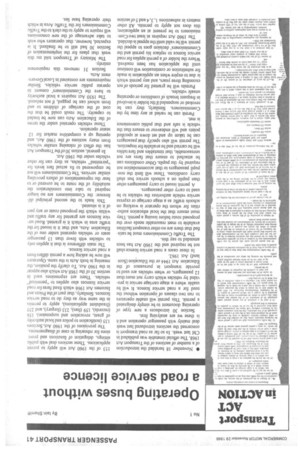Operating buses without a road service licence
Page 43

If you've noticed an error in this article please click here to report it so we can fix it.
• November 18 heralded the introduction of a number of sections of the Transport Act 1968. The official timetable was published in CM last week. In so far as road transport is concerned the sections introduced last week deal mainly with passenger operation and it is these we are analysing first.
Section 30 introduces a new type of operating document to be simply designated a permit. This permit will enable operators to run two classes of `operation without the need for a road service licence. It will be usable where a stage carriage service is provided by vehicles which carry not more than 12 passengers, or when vehicles are used to provide transport in pursuance of the Education Act 1944 or the Education (Scotland) Act 1962.
In these cases a road service licence shall not be required and the 1960 Act has been amended to say this.
The Traffic Commissioners must be satisfied that there are no other transport facilities available to meet reasonable needs over the proposed route before issuing a permit. They must ensure that the local education authorities for whom the operator is working on schools traffic as a stage carriage or express service vehicle authorizes the vehicles to be used to carry other passengers.
A permit issued to carry passengers other than pupils on a schools service bus shall carry conditions. These will limit the nonpupil passengers to that accommodation not required by the pupils. Other conditions can be attached to ensure that fares are not unreasonable, that timetables and fare tables will be carried and be available for inspection. The permit will also specify that passengers can be taken up and set down at specified points and will endeavour to ensure that the vehicle is safe and that public convenience is met.
Permit can be varied at any time by the Commissioners. Similarly, they can be revoked of suspended if the holder is involved in frequent breach of conditions or operating unsafe vehicles.
Permits will be granted for periods of not exceeding three years, and any permit which is due to expire when an application is made for substitution or continuation will continue until the application has been resolved. Where the holder of a permit applies for road service licence to replace his permit and the Commissioners' decision goes to appeal the permit will be valid until the appeal is decided.
The 1960 Act requires at least two Commissioners to be present at an application; this does not apply to permits. All other matters in subsections 1, 3, 4 and 5 of section 153 of the 1960 Act will apply to permit applications. These sections deal with public sittings, delegation of function § and provi sions for rehearing in case of disagreements.
The provisions of the 1960 Act, Sections 135 (notification to police and local authority of grant, revocation and suspension). 156 (records), 159 (fees), 233 (forgery), and 235 (fraudulent applications), apply to permits in the same way as they do to road service licences. Similarly, that part of the Prices and Incomes Act 1966 which fixed fares for road service licences also applies to "permitted" vehicles. There are expressions used in section 30 of the 1968 Act which also appear in the 1960 Act. To clarify the position, the meaning in both Acts is the same. Operators will now be asking how a permit differs from a road service licence.
The main difference is that it applies only to vehicles with fewer than 13 passenger seats or vehicles operated under one of the Education Acts, and that it is issued for the traffic area in which it is granted. Road ser vice licences are granted for any traffic and within Which the proposed route or any part of it is situated.
This leads to the second principal difference: the Commissioners are no longer required to take into consideration the suitability of the route to be, covered or to hear the representations of others providing similar services. The Commissioners will not be empowered to fix actual fare levels for "permitted" vehicles, as they can for other vehicles under the 1960 Act.
In general, section 30 of the Transport Act has the effect of releasing smaller vehicles from many sections of the 1960 Act, and opening up a competitive market for 12 seater operation.
Those vehicles operated under the terms of the Education Acts can now be loaded to capacity. The result could be that the cost of the carriage of children to and from school can be pegged, if not reduced. The 1930 Act requires a local authority to have the Commissioners' consent to operate public service vehicles. Similar requirements are contained in Local Government Acts.
Section 31 removes this requirement entirely.
The Ministry of Transport told me this week that plans for the implementation of Section 30 had still to be finalized. It is expected, however, that operators who wish to take advantage of the new concessions will require to apply to the clerk to the Traffic Commissioners for the Traffic Area in which their operating base lies.




















































































































